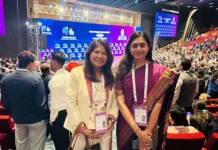[ Dr Liyi Karso & Madhu Raghavendra ]
With globalization and modernization, there has been a shift in the ideas of parenthood. Parents these days try to be more aware of and involved with the wellbeing of their children. This is generally an anxious place to be in: the balance between over-parenting and neglecting your child.
If you are a new parent, you would know that the common saying that it takes a village to raise a child is not overrated. Although parenting is an art and, like with most art forms, there is no ‘how to’ guide for parenting, it helps to keep a few pointers in check. The ‘how to’ guides may be overlooked as every child is biologically and socially unique.
One cannot prepare would be or new parents enough for parenthood. If you have been an uncle or an aunt who has held their nephew or niece only a few times and took photos for Facebook or Instagram, and thought it is cool to have a baby, the journey to parenthood will shake all your premonitions. Parenthood introduces you to an all-new self; you are stronger, you suddenly become hyper vigilant for your child, and yet a new mother is equally vulnerable, both physically and emotionally.
Here comes the importance of co-parenting. The involvement of the father in the day-to-day development of the child is very important. The idea of raising the child by the mother alone, and the father playfully featuring a few times during the week is obsolete. Co-parenting allows the child to explore bond-building as much with the father, and also gives the mother some conscious time for herself, which she usually forgets in the process of intensive care-giving to the baby. It further helps the father to make himself feel like a part of the process, rather than leaving them alone and being lost as to what role he has to play.
Monitoring mobile phone use
It may appear as though we are using phones to educate them through YouTube rhymes and varied apps for children, but it would be more creative for the parents to learn a few of those rhymes and role-play. Also, if the child is observing their parents all the time on the phone or watching TV, they may imbibe that habit sooner, irrespective of your restrictions for the child.
Engage children in some art, music, games and outing. Try and develop your own little quirky thing with the child, which will make the bond more special.
Nutritional intake
Until six months, exclusive feeding of mother’s milk is known. The challenge comes thereafter, when the parents need to get creative with introducing new foods, observing what they like and dislike, and at the same time maintaining a balance in nutrition.
Selective feeding of only few foods (like readymade baby foods, rice, dal, puree) may get babies disinterested in eating wholesomely. Developing a diverse taste from the very beginning may reduce their future intake of processed food like chips, noodles, artificially sweetened drinks, etc.
All time is not disciplining time
Saying ‘No’ to everything is not the best way out of every situation where the child is about to touch or do something. This may make the child more cranky and stressful. Tearing, breaking, turning things upside down is a child’s way of exploring. Find a middle ground. Maybe if the child is about to tear the novel that you are reading, replace it with a newspaper, try to tell a story from some newspaper image, if you wish to go all the way. We need to give children the freedom to explore, along with some love and care. We too need to free ourselves to become children again.
It is good to remember these few lines from Kahlil Gibran’s poem, ‘On Children’: ‘You may give them your love but not your thoughts, for they have their own thoughts. You may house their bodies but not their souls, for their souls dwell in the house of tomorrow, which you cannot visit, not even in your dreams. You may strive to be like them, but seek not to make them like you.’ (Dr Liyi Karso is Research Officer, Central Council for Research in Homoeopathy, Govt of India. Madhu Raghavendra is a poet and social development practitioner.)

